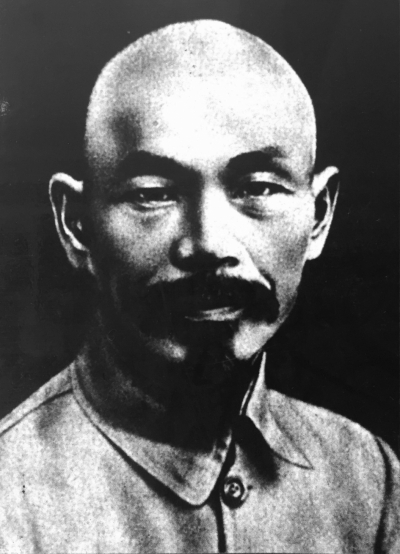[Heroes and Martyrs Spectrum] Luo Huacheng: "The most practical revolutionary talent"

[For the sake of national rejuvenation, heroic martyrs spectrum]
Xinhua News Agency, Fuzhou, November 29th, by reporter Hongyi Chen.There is a photo in a revolutionary history exhibition hall in Changting County, Fujian Province. In the photo, a soldier with a firm eye and a uniform looks ahead. He is Luo Huacheng, a martyr who struggled for the revolutionary cause all his life.
Luo Huacheng was born in 1895 in a family of traditional Chinese medicine in Nanshan Village, Nanyang District, Changting County, Fujian Province. He studied medicine with his father since childhood. He entered Fuzhou Sericulture School in 1912, and returned to Changting after graduation in 1915 to teach in the county sericulture school. After the May 30th massacre in Shanghai in 1925, he, Zhang Chinan, Yang Chengwu and others initiated the establishment of "Changting Student Union", organized a rally to support Shanghai workers, denounced imperialist crimes, and founded "Changting Monthly" to attack the disadvantages of the times and publicize the revolution. Joined the Communist Party of China (CPC) in September 1927.
In June 1928, Luo Huacheng established secret peasant associations and developed party organizations in Nanyang and Caixi. In July of the following year, he led the "Nanyang riots". After the victory of the uprising, the "Tinglian South Red Guard" was established, and the people in the border areas of Changting and Shanghang were actively mobilized to fight local tyrants and divide the fields, thus establishing the Soviet regime. In the autumn of 1929, the Red Guard led by him was incorporated into the fourth column of the Fourth Army of the Red Army, and he served as the captain of the column spy brigade. In December of the same year, he attended Gutian Conference. In August, 1930, Luo Huacheng was wounded in the battle with the militia in Caifang, Hetian, Changting. Later, he served as Dean of the Red Army Rear Hospital, Director of the Rear Office of Fujian Military Region, Deputy Secretary-General of Fujian Soviet Government and Minister of Armed Mobilization Department.
In October 1934, after the Long March, the main force of the Central Red Army, Luo Huacheng returned to western Fujian to help Zhang Dingcheng, Deng Zihui and Tan Zhenlin persist in guerrilla warfare in the border area between Fujian and Guangdong. In August 1935, he was surrounded by the Kuomintang in Sidu, unfortunately arrested and tortured in Ruijin prison, but he was unyielding. A few days later, he escaped from the tiger’s mouth on the way to Changting and arrived in Hong Kong via Shanghai.
In July 1937, after the outbreak of the National Anti-Japanese War, Luo Huacheng was ordered to return to work in southwest Fujian as the director of the Quartermaster Division of the second detachment of the New Fourth Army. In the spring of 1939, he served as deputy director of the political department of the second detachment. In October of the same year, he served as director of the political department. He led his troops into the rear of the enemy lines in the south of the Yangtze River, and took charge of local work in Dangtu, Wuhu and Jiangning. He successively established anti-Japanese democratic regimes at the county, district and township levels and grassroots organizations of the Communist Party of China, and organized farmers, youth and women to form anti-Japanese mass organizations.
Due to the long and hard fighting life, Luo Huacheng broke down from overwork and suffered from heart attacks from time to time. Comrade Chen Yi repeatedly advised him to go to the rear for illness, and wrote an ancient poem, "There is a bright moon in all lakes, so why worry about it?" Luo Huacheng replied with the ancient poem "Don’t laugh when you are drunk in the battlefield, but how many people have fought in ancient times", politely declined Chen Yi’s suggestion and continued to work in the front line of the Anti-Japanese War despite illness.
On February 27th, 1940, Luo Huacheng had a sudden heart attack and died in Liyang, Jiangsu Province at the age of 45. Chen Yi called Luo Huacheng "an outstanding leading cadre of the New Fourth Army" and "the most practical revolutionary talent" at the memorial meeting. In February 1955, Luo Huacheng was chased as a martyr.
In recent years, Changting County, Fujian Province, the hometown of Luo Huacheng’s martyrs, based on the advantages of red resources, has made great efforts to protect, inherit and carry forward the red culture, constantly activated the carriers and forms, promoted the transformation and upgrading of the development of red culture, promoted the red spirit from generation to generation, and accelerated the development of the old district.